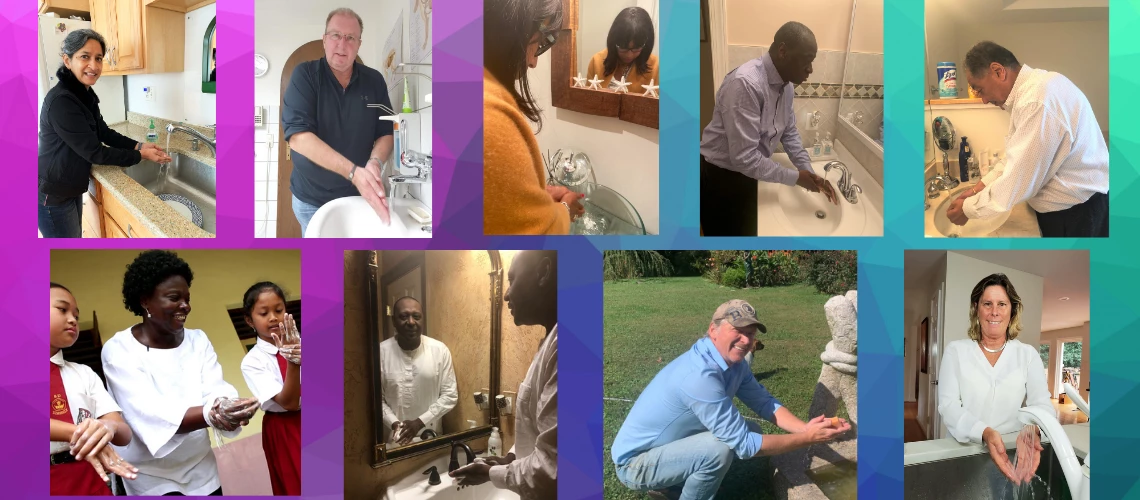 Global Handwashing Day
Global Handwashing Day
October 15 was Global Handwashing Day, with its clarion call that to beat the virus today and ensure better health outcomes beyond the pandemic, hand hygiene must be a priority now and in the future.
Today, nearly half of schools across the world lack handwashing facilities with water and soap, affecting 900 million school-age children. And in 16 percent of healthcare facilities, there are no handwashing facilities in the areas where patients receive care or near the toilets. Without access to safe water and sanitation services and effective hygiene protocols, many of our client countries will be unable to re-open schools, workplaces and other public spaces, and health services will continue to be limited. This threatens to reverse years of hard-won gains in human capital.
The World Bank along with its partners – UNICEF, WHO, and others – is committed to galvanizing government-led programs and working across sectors to prioritize the delivery of hand hygiene for all. These programs will succeed with proven transformative models, requiring:
- Political leadership and commitment at the highest level to create the political, societal, and behavioral changes to deliver hand hygiene services to more people, more efficiently.
- Strong enabling environment built through institutional arrangements and public and private finance and credible information to deliver and sustain services while also improving policies, incentives, capacity and regulations to support the water sector to operate more efficiently.
- Partnerships to address the scale of investments required for robust supply and demand, crowding in the private sector and tapping innovations in service delivery.
- Inclusive participation is essential, whether it’s public participation in the design of handwashing stations, or citizens’ response to trusted communications for building a movement for behavioral change in hygiene practices.
The World Bank’s water teams have been working closely with countries and partners to ensure communities have access to fixed and portable handwashing facilities, soap or alcohol-based hand rubs, and reliable water supplies. We are also helping people understand the benefits of handwashing through educational and behavioral tools and tactics.
- In Ghana, the Greater Accra Metropolitan Area (GAMA) Sanitation and Water Project is providing WASH facilities in 260 school compounds (some compounds have more than one school) with separate blocks for girls and boys. Each school is provided with water supply and adequate handwashing facilities, both within and outside the toilet blocks so that children can access the handwashing facilities easily and more frequently.
- In Haiti, the Sustainable Rural and Small Towns Water and Sanitation Project supported the Regional Water Supply and Sanitation Office (OREPA) in launching a large-scale public awareness campaign, improved handwashing facilities, and the provision of water trucking to underserved areas. The campaign promoted good handwashing behavior, hygiene, physical distancing, and the use of face masks by deploying posters, videos, social media messages, radio announcements, and recordings broadcast from cars and motorbikes. In partnership with UNICEF, the project financed two programs to install 390 handwashing stations at critical locations, including in densely populated places like markets, orphanages, prisons, and health care centers.
- In Kyrgyz Republic, the Sustainable Rural Water Supply and Sanitation Project has hired social mobilization specialists to train village health committees, to ensure that even the most remote areas are reached. The campaigns also include a variety of interactive exercises designed specifically for school children, including activities like “Glow Germ” to demonstrate hand contamination, the formation of student “WASH committees,” and school sanitation competitions. This is being done alongside the upgrading of toilets and hygiene rooms for girls in schools, and engaging school administrators and parents to ensure that soap and toilet paper are available.
- In Indonesia, the country’s Community Based Drinking Water Supply and Sanitation program, or PAMSIMAS, has focused on a community-driven approach to behavior change for adoption of good hygiene practices. By empowering communities and local-level institutions to develop solutions that work best to meet their specific needs, many have been able to eliminate poor sanitation and adopt sound hygiene practices. For example, in the Samustida Village, the program's facilitator coordinated with various stakeholders to help build fifteen handwashing facilities with adequate water supply and soap. In the Kedungmundu Village, on the other hand, the community proactively sprayed disinfectants in mosques and distributed free face masks. These activities were funded by the PAMSIMAS village fund.
- In Sri Lanka, the Water Supply and Sanitation Improvement Project in Sri Lanka has been supporting and organizing intensive hygiene promotion programs to educate communities -- especially schoolchildren -- on practices such as handwashing, proper use of latrines, menstrual hygiene, and preventing the contamination of water sources. Targeted messages and resources have been provided in local languages to ensure their relevance and effectiveness. And hygiene programs have been rolled out in schools so young people can share what they learned with their friends and families.
- In Yemen, the Emergency Health and Nutrition Project (EHNP) in Yemen has carried out several critical WASH interventions, including the distribution of hygiene kits, chlorine tablets, jerry cans, disinfection materials and storage, as well as hygiene promotion centered on key practices such as handwashing with soap, food hygiene and proper use of latrines. Rapid Response Teams have conducted house-to-house campaigns in 20 governorates. To protect people from COVID-19, EHNP is also continuing to help repair and upgrade water and sanitation systems and install or replace handwashing sinks in health care facilities and schools.
The COVID-19 pandemic provides a powerful reminder that one of the most effective ways to stop the spread of a virus is also one of the simplest: hand hygiene, especially through handwashing with soap. It is time for action on bridging COVID-19 response efforts into long-term handwashing prioritization.


Join the Conversation